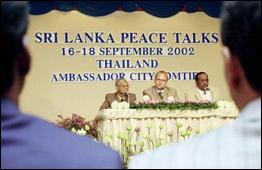Preliminary steps towards interim administration agreed
[TamilNet, Wednesday, 18 September 2002, 17:53 GMT]
Preliminary steps towards an interim administration for the Tamil areas of the island were agreed as part of the first direct Norwegian facilitated talks between the Liberation Tigers and the Sri Lankan government, the chief negotiators of both sides told a press conference in Sittahip, Thailand Wednesday.
“We have also discussed the setting up of an interim administration in the course of the coming sessions,” Mr. Anton Balasingham, Chief Negotiator of the LTTE said.
“We have not gone into details of the composition or structure (of the interim administration) but we have prepared the ground for it. We have taken the preliminary steps necessary to create the conditions conducive [for it],” Sri Lanka’s Chief Negotiator, Prof. G. L. Peiris said. “We have agreed amongst ourselves on how to take this forward.”
“[In future sessions] we will also be able to discuss the post-interim administration set up and core issues will be taken up,” Mr. Balasingham added, pointing out “this process will only succeed if we take up the issues one by one.”
 |
|
Sri Lanka's Constitutional Affairs Minister and leader of the government delegation, G.L. Peiris, left on the podium, Norway's Deputy Foreign Minister Vidar Helgesen, centre, and Chief negotiator of the Liberation Tigers of Tamileelam, Anton Balasingham, right, hold a joint news conference after the three-day peace talks in Thailand.
|
When asked about protests in southern Sri Lanka that the interim administration would lead to a permanent division of the country, Mr. Peiris replied: “The interim administration is exactly what it’s name connotes: it is a step on the way. It has to be seen as part of a process. It does not stop there. Apprehensions on that score are entirely unfounded.”
“There is a misconception in Colombo that the interim administration is going to be an end in itself,” Mr. Balasingham said. “The interim administration will be part of an organic process of reaching a final settlement.”
“There is nothing wrong in setting up an administrative structure. The LTTE must be given a pivotal role to play,” Mr. Balasingham said. “You have to give space and opportunity for our fighters and cadres to run the administration in our own homeland.”
“But [the interim administration] is a useful mechanism,” Mr. Peiris said. “Far from doing any damage, it is necessary – amongst other things - to accelerate the economic development of those areas. It will provide a coherent structure within which development programs can be undertaken.”
“There will be proper fiscal responsibility. You will know who are the officials entrusted with particular functions. You need a formal structure like that to undertake the kind of development on the scale needed at present,” he said further.
Asked by a reporter if the interim administration “would be handed over to the LTTE,” Mr. Peiris responded: “I think the phrase ‘handing over’ is very unfortunate. I think that is the wrong way to look at problems of this kind. What we are thinking of structures which will enable a partnership.”
“Parties have to work with each other. They have to be involved in matters. Participation is indispensable if there is to be a political solution. Of there is no question of excluding anyone. These structures have to be all inclusive, they have to reflect ethnic diversity and cater for aspirations of all sections of our people,” he said.
“It is premature to comment on the nature, structure and function of the envisaged interim set up,” Mr. Balasingham said. “I think that as Professor Peiris has correctly said, we would be exploring these possibilities and work out an amicable framework that would satisfy the aspirations of our people as well as the Muslim people and also the Sinhalese people living in the north east.”
Mr. Balasingham rejected the suggestion that the LTTE was seeking an interim administration as a halfway stage to a separate state. “You must remember that the LTTE already has a permanent administration in our controlled areas. In actual fact what we are seeking is international legitimacy for administrative structure where we can coordinate and work with the government of Sri Lanka,” he said.











